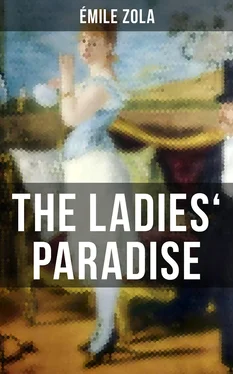“And gloves,” added Madame Baudu; “isn’t it monstrous? He has even dared to add a glove department! Yesterday, as I was going along the Rue Neuve-Saint-Augustin, I saw Quinette, the glover, at his door, looking so downcast that I hadn’t the heart to ask him how business was going.”
“And umbrellas,” resumed Baudu; “that’s the climax! Bourras feels sure that Mouret simply wants to ruin him; for, in short, where’s the rhyme between umbrellas and drapery? But Bourras is firm on his legs, and won’t allow himself to be beggared. We shall see some fun one of these days.”
He spoke of other tradesmen, passing the whole neigbourhood in review. Now and again he let slip a confession. If Vinçard wanted to sell it was time for the rest to pack up, for Vinçard was like the rats who leave a house when it threatens to fall in. Then, immediately after, he contradicted himself, alluded to an alliance, an understanding between the small tradesmen in order to fight the colossus. He hesitated an instant before speaking of himself, his hands shaking, and his mouth twitching in a nervous manner. At last he made up his mind.
“As for myself, I can’t complain as yet. Of course he has done me harm, the scoundrel! But up to the present he only keeps ladies’ cloths, light stuffs for dresses and heavier goods for mantles. People still come to me for men’s goods, velvets for shooting suits, cloths for liveries, without speaking of flannels and serges, of which I defy him to show as good an assortment. But he thinks to annoy me by planting his cloth department right in front of my door. You’ve seen his display, haven’t you? He always places his finest made-up goods there, surrounded by a framework of various cloths—a cheapjack parade to tempt the women. Upon my word, I should be ashamed to use such means! The Old Elbeuf has been known for nearly a hundred years, and has no need for such at its door. As long as I live, it shall remain as I took it, with a few samples on each side, and nothing more!”
The whole family was affected. Geneviève ventured to make a remark after a silence:
“You know, papa, our customers know and like us. We mustn’t lose heart. Madame Desforges and Madame de Boves have been today, and I am expecting Madame Marty for some flannel.”
“I,” declared Colomban, “I took an order from Madame Bourdelais yesterday. ‘Tis true she spoke of an English cheviot marked up opposite ten sous cheaper than ours, and the same stuff, it appears.”
“Fancy,” murmured Madame Baudu in her weak voice, “we knew that house when it was scarcely larger than a handkerchief! Yes, my dear Denise, when the Deleuzes started it, it had only one window in the Rue Neuve-Saint-Augustin; and such a tiny one, in which there was barely room for a couple of pieces of print and two or three pieces of calico. There was no room to turn round in the shop, it was so small. At that time The Old Elbeuf, after sixty years’ trading, was as you see it now. Ah! all that has greatly changed!”
She shook her head; the drama of her whole life was expressed in these few words. Born in the old house, she loved every part of it, living only for it and by it; and, formerly proud of this house, the finest, the best patronized in the neighborhood, she had had the daily grief of seeing the rival establishment gradually growing in importance, at first disdained, then equal to theirs, and finally towering above it, and threatening all the rest. This was for her a continual, open sore; she was slowly dying from sheer grief at seeing The Old Elbeuf humiliated, though still living, as if by the force of impulse, like a machine wound up. But she felt that the death of the shop would be hers as well, and that she would never survive the closing of it.
There was a painful silence. Baudu was softly beating a tattoo with his fingers on the American cloth on the table. He experienced a sort of lassitude, almost a regret at having relieved his feelings once more in this way. In fact, the whole family felt the effects of his despondency, and could not help ruminating on the bitter story. They never had had any luck. The children had been educated and started in the world, fortune was beginning to smile on them, when suddenly this competition sprang up and ruined their hopes. There was, also, the house at Rambouillet, that country house to which he had been dreaming of retiring for the last ten years—a bargain, he thought; but it had turned out to be an old building always wanting repairs, and which he had let to people who never paid any rent. His last profits were swallowed up by the place—the only folly he had committed in his honest, upright career as a tradesman, obstinately attached to the old ways.
“Come, come!” said he, suddenly, “we must make room for the others. Enough of this useless talk!”
It was like an awakening. The gas hissed, in the dead and stifling air of the small room. They all jumped up, breaking the melancholy silence. However, Pépé was sleeping so soundly that they laid him on some bales of cloth. Jean had already returned to the street door yawning.
“In short,” repeated Baudu to his niece, “you can do as you like. We have explained the matter to you, that’s all. You know your own business best.”
He looked at her sharply, waiting for a decisive answer. Denise, whom these stories had inspired with a still greater longing to enter The Ladies’ Paradise, instead of turning her from it, preserved her quiet gentle demeanor with a Norman obstinacy. She simply replied: “We shall see, uncle.”
And she spoke of going to bed early with the children, for they were all three very tired. But it had only just struck six, so she decided to stay in the shop a little longer. Night had come on, and she found the street quite dark, enveloped in a fine close rain, which had been falling since sunset. She was surprised. A few minutes had sufficed to fill the street with small pools, a stream of dirty water was running along the gutters, the pavement was thick with a sticky black mud; and through the beating rain she saw nothing but a confused stream of umbrellas, pushing, swinging along in the gloom like great black wings. She started back at first, feeling very cold, oppressed at heart by the badly-lighted shop, very dismal at this hour of the day. A damp breeze, the breath of the old quarter, came in from the street; it seemed that the rain, streaming from the umbrellas, was running right into the shop, that the pavement with its mud and its puddles extended all over the place, putting the finishing touches to the moldiness of the old shop front, white with saltpetre. It was quite a vision of old Paris, damp and uncomfortable, which made her shiver, astonished and heartbroken to find the great city so cold and so ugly.
But opposite, the gas-lamps were being lighted all along the frontage of The Ladies’ Paradise. She moved nearer, again attracted and, as it were, warmed by this wealth of illumination. The machine was still roaring, active as ever, hissing forth its last clouds of steam; whilst the salesmen were folding up the stuffs, and the cashiers counting up the receipts. It was, as seen through the hazy windows, a vague swarming of lights, a confused factory-like interior. Behind the curtain of falling rain, this apparition, distant and confused, assumed the appearance of a giant furnace-house, where the black shadows of the firemen could be seen passing by the red glare of the furnaces. The displays in the windows became indistinct also; one could only distinguish the snowy lace, heightened in its whiteness by the ground glass globes of a row of gas jets, and against this chapel-like background the readymade goods stood out vigorously, the velvet mantle trimmed with silver fox threw into relief the curved profile of a headless woman running through the rain to some entertainment in the unknown of the shades of the Paris night.
Читать дальше












